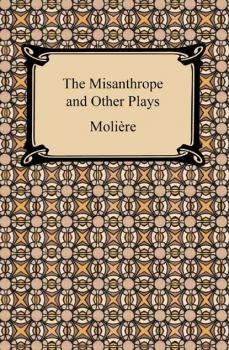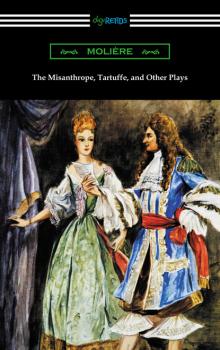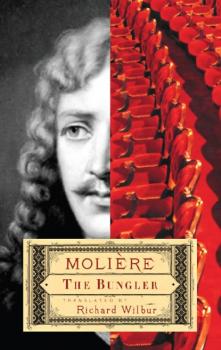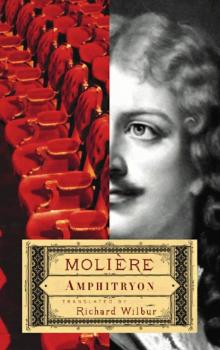Moliere
Список книг автора MoliereThe Shopkeeper Turned Gentleman
"The Shopkeeper Turned Gentleman" by Molière (translated by Charles Heron Wall). Published by Good Press. Good Press publishes a wide range of titles that encompasses every genre. From well-known classics & literary fiction and non-fiction to forgotten−or yet undiscovered gems−of world literature, we issue the books that need to be read. Each Good Press edition has been meticulously edited and formatted to boost readability for all e-readers and devices. Our goal is to produce eBooks that are user-friendly and accessible to everyone in a high-quality digital format.
Sganarelle, or, the Self-Deceived Husband
"Sganarelle, or, the Self-Deceived Husband" by Molière. Published by Good Press. Good Press publishes a wide range of titles that encompasses every genre. From well-known classics & literary fiction and non-fiction to forgotten−or yet undiscovered gems−of world literature, we issue the books that need to be read. Each Good Press edition has been meticulously edited and formatted to boost readability for all e-readers and devices. Our goal is to produce eBooks that are user-friendly and accessible to everyone in a high-quality digital format.
The Jealousy of le Barbouillé (La Jalousie du Barbouillé)
"The Jealousy of le Barbouillé (La Jalousie du Barbouillé)" by Molière (translated by Charles Heron Wall). Published by Good Press. Good Press publishes a wide range of titles that encompasses every genre. From well-known classics & literary fiction and non-fiction to forgotten−or yet undiscovered gems−of world literature, we issue the books that need to be read. Each Good Press edition has been meticulously edited and formatted to boost readability for all e-readers and devices. Our goal is to produce eBooks that are user-friendly and accessible to everyone in a high-quality digital format.
Tartuffe
Jean Baptiste Poquelin, better known by his stage name of Moliere, stands without a rival at the head of French comedy. His many great plays include «The School for Husbands» and «The School for Wives,» «The Misanthrope» and «The Hypocrite» (Tartuffe), «The Miser» and «The Hypochondriac,» «The Learned Ladies,» «The Doctor in Spite of Himself,» «The Citizen Turned Gentleman,» and many others, in which he exposed mercilessly one after another the vices and foibles of the day. His characteristic qualities are nowhere better exhibited than in «Tartuffe.» Compared with such characterization as Shakespeare's, Moliere's method of portraying life may seem to be lacking in complexity; but it is precisely the simplicity with which creations like Tartuffe embody the weakness or vice they represent that has given them their place as universally recognized types of human nature.
The Misanthrope and Other Plays
Written during the highly successful final years of his life, the plays contained in this edition represent the pinnacle of Moliere's artistry and the most profound demonstration of his vision of humanity: «The Misanthrope,» «The Doctor in Spite of Himself,» a hilarious example of Molière's long-standing skepticism of the medical profession, «The Miser,» «The Shopkeeper Turned Gentleman,» «The Impostures of Scapin,» «The Learned Women,» and «The Imaginary Invalid,» the play that Molière appeared in only hours before his death. These works combine all the traditional elements of comedy—wit, slapstick, spectacle and satire, with a certain deep understanding of character that Molière was notorious for. His highly popular work, «The Misanthrope,» satirizes the hypocrisies of aristocratic French society, and paints an accurate picture of the upper-class world in which Molière, looked down upon as a playwright, was ultimately denied membership to.
Tartuffe and Other Plays
This work includes seven of the plays that accredited Molière as the greatest and best-loved French playwright of all times: «The Pretentious Young Ladies,» «The School for Husbands,» «The School for Wives,» a comedy of infidelity and his first great success, «The Critique of the School for Wives,» «The Impromptu of Versailles,» «Tartuffe,» a highly controversial play in its time, and «Don Juan.» Although «Tartuffe» was immediately censured and banned for several years after its appearance on the stage because of its strong focus on religious hypocrisy, it is considered today to be one of Molière's masterworks. These plays are highly revered for their humor, imagination, and their keen observations of humanity. The actor and playwright realized early on that in order for comedy to be successful, it must have a basis in truth; in this way his plays emanate a sense of reality and universality that withstand the tests of time.
The Misanthrope (Translated by Henri Van Laun with an Introduction by Eleanor F. Jourdain)
Jean-Baptiste Poquelin, known popularly by his stage name Molière, is regarded as one of the masters of French comedic drama. When Molière began acting in Paris there were two well-established theatrical companies, those of the Hôtel de Bourgogne and the Marais. Joining these theatrical companies would have been impossible for a new member of the acting profession like Molière and thus he performed with traveling troupes of actors in the French provinces. It was during this period that Molière would refine his skills as both an actor and a writer. Eventually his reputation would increase allowing him to return to Paris where he gained the patronage of Philippe I, Duke of Orléans, the brother of the King of France, Louis XIV. In this volume one of Molière’s most popular works is presented, one in which the author draws upon his bourgeoisie upbringing in 17th century France. “The Misanthrope” is a comedy of errors which satirizes the hypocrisies of French aristocratic society. The story is concerned with the relationship between Alceste, a French gentleman who laments the superficiality of society life, and Célimène, a woman who epitomizes the courtly manners that Alceste despises. This edition is translated by Henri Van Laun, includes an introduction by Eleanor F. Jourdain, and a biographical afterword.
The Misanthrope, Tartuffe, and Other Plays (with an Introduction by Henry Carrington Lancaster)
Jean-Baptiste Poquelin, known popularly by his stage name Molière, is regarded as one of the masters of French comedic drama. When Molière began acting in Paris there were two well-established theatrical companies, those of the Hôtel de Bourgogne and the Marais. Joining these theatrical companies would have been impossible for a new member of the acting profession like Molière and thus he performed with traveling troupes of actors in the French provinces. It was during this period that Molière would refine his skills as both an actor and a writer. Eventually his reputation would increase allowing him to return to Paris where he gained the patronage of Philippe I, Duke of Orléans, the brother of the King of France, Louis XIV. This collection of Molière’s plays includes some of his most notable compositions. In “The Misanthrope”, a comedy of errors which satirizes the hypocrisies of French aristocratic society, the author draws upon his bourgeoisie upbringing in 17th century France. “Tartuffe” is the story of Orgon, the head of his family, who has fallen under the influence of Tartuffe, an imposter who pretends to be pious and to speak with divine authority. These plays along with “The School for Wives”, “The School for Wives Criticized”, and “The Impromptu at Versailles” exhibit the dramatist at his comedic best. This edition includes an introduction by Henry Carrington Lancaster and a biographical afterword.
The Bungler
“A mischievous new translation by the poet Richard Wilbur, [The Bungler] is great good fun and should open the gate for the play to be presented with the regularity it deserves.”—Bruce Weber, The New York Times “My notion of translation is that you try to bring it back alive. Speak-ability is so important. . . . I came to see that a line that simply says ‘I love you,’ at the right point in the show, is entirely adequate, that a great deal of verbal sophistication is not necessarily called for.”—Richard Wilbur Poet Richard Wilbur’s translations of Molière’s plays are loved, renowned, and performed throughout the world. This volume is part of Theater Communications Group’s new series (with cover designs by Chip Kidd) to complete trade publication of these vital works of French neoclassical comedy. The Bungler is Molière’s first recognizably great play, and the first to be written in verse. The charming farce is set in Sicily and born of the great Italian tradition of the commedia dell’arte: Loyal valet Mascarille schemes to win the lovely Celie away from rival Leadre, and into the arms of his master Leslie. Molière himself originated the role Mascarille, self-described as “the rashest fool on earth,” who naturally bungles the job along the way. Richard Wilbur is a two-time Pulitzer Prize winner and a former Poet Laureate of the United States. His publications include six volumes of poetry and two collections of selected verses, a collection of prose, and two books for children.
Amphitryon
– Mr. Wilbur has won the Pulitzer Prize and was a past Poet Laureate of the U.S. – Original cover designs by Chip Kidd. – Completes the publication of all of Wilbur's verse translations of Moliere in quality paper editions.









